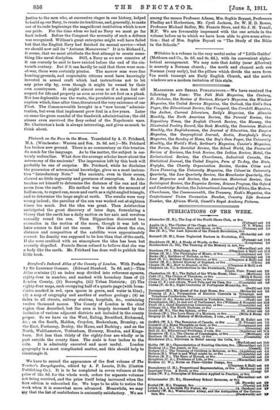Plutarch on the Face in the Moon. Translated by A.
0. Prickard, MA. (Winchester : Warren and Son. 2s. 6d. net.)—Mr. Prickard has broken now ground. There is no commentary on this treatise. So much for the language. As to the matter, the subject is cer- ta:nly unfamiliar. What does the average scholar know about the astronomy of the ancients? The impression left by this book will probably be one of surprise. Mr. Prickard, while he disclaims the possession of astronomical knowledge, gives us a most instruc- tive "Introductory Note." The ancients, even in their errors, showed no little ingenuity and greatness of conception. So Aris- taichus set himself to determine the distance of the sun and the moon from the earth. His method was to catch the moment of half-mcon, to regard sun, moon and earth as a right-angled triangle, and to determine the large angle at earth. The results were very wrong indeed ; the parallax of the sun was worked out at eighteen times too much. But the idea was great. Then Aristarchus anticipated the great discovery of later days, formulating a theory that the earth has a daily motion on her axis and revolves annually round the sun. Then Hipparchus discovered two anomalies in the motion of the moon, though it was left to later science to find out the cause. The ideas about the size, distance and composition of the satellite were approximately correct. Its density was supposed to be less than that of the earth. If she were credited with an atmosphere the idea has been but recently dispelled. Francis Bacon refused to believe that she was a body like the earth. Mr. Prickard has done well to publish this li ale book.






































 Previous page
Previous page